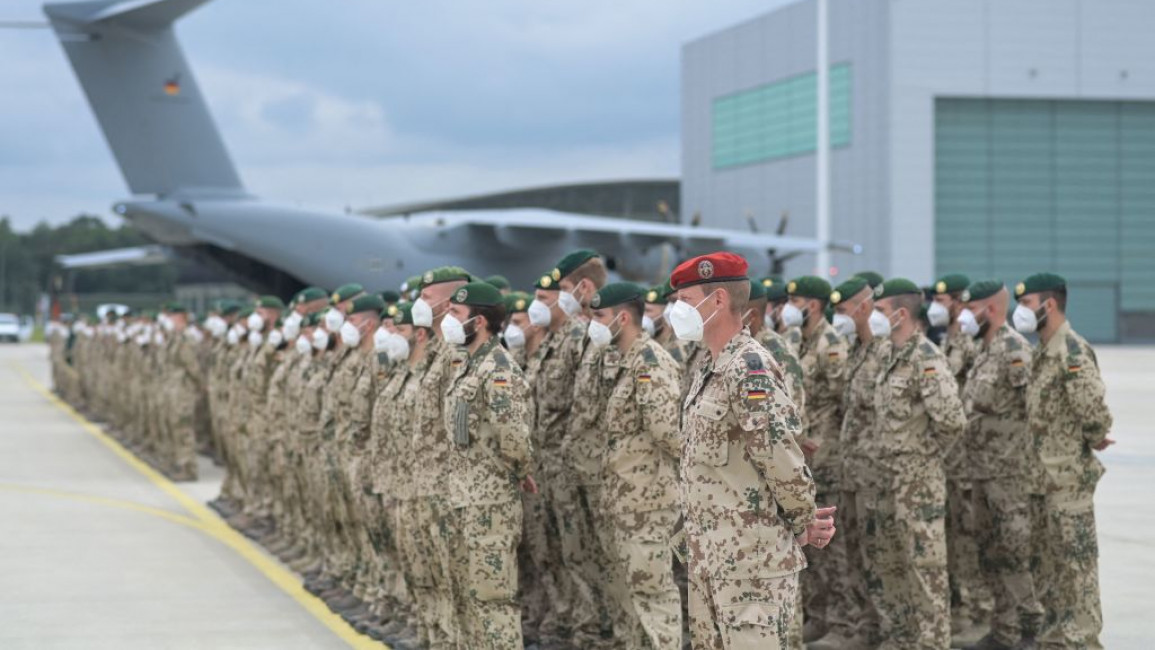Most European troops exit Afghanistan quietly after 20 years, amid concerns of civil war in the country say military officials
Most European troops have already pulled out of Afghanistan, quietly withdrawing months before the US-led mission was officially expected to end, resulting in an anticlimactic close to the “forever war” that risks leaving the country on the brink of civil war.
Germany and Italy declared their missions in Afghanistan over on Wednesday and Poland's last troops returned home, bringing their deployments to a low-key end nearly 20 years after the first Western soldiers were deployed in the country.
Announcements from several countries analysed by The Associated Press show that a majority of European troops left with little ceremony - a stark contrast to the dramatic and public show of force and unity when NATO allies lined up to back the US invasion to rid the country of al-Qaida after the September 11 attacks in 2001.
In the ensuing decades, the war went from one mission to another. Former US President George W. Bush's administration shied away from nation-building and the United Nations advocated a light footprint.
But with the passing years, NATO and US troops took on greater roles developing Afghanistan's National Security and Defence Forces and training police.
At the war's peak, the US and NATO military numbers surpassed 150,000.
NATO agreed in April to withdraw its roughly 7,000 non-American forces from Afghanistan to match US President Joe Biden’s decision to pull all American troops from the country, starting May 1.
Biden set the deadline of September 11 2021 for the withdrawal of US troops. But more recently, American officials have said the pullout is likely to be complete by July 4. Many allies have moved to wrap up their own presence by then as well.
NATO declined to give an update on Wednesday on how many nations still have troops in its Resolute Support mission. But an analysis of 19 governments' announcements shows that more than 4,800 of the non-American forces have left. The US has refused to give troop figures, but when Biden announced the final pullout, between 2,500 and 3,500 troops were deployed.
As of February, a total of some 832,000 American troops served in Afghanistan and about 25,100 Defence Department civilians were also deployed there.
The US has refused to give a clear date for a final withdrawal.
White House Press Secretary Jen Psaki said on Wednesday that the US withdrawal remains “on the timeline that the president announced ... which is to get our troops out of Afghanistan, while having a remaining diplomatic presence on the ground, by September."
Germany announced the end of its nearly 20-year deployment in a statement and a series of tweets from their defence minister late Tuesday, shortly after the last plane carrying its troops had left Afghan airspace.
Three transport aircrafts landed at the Wunstorf airbase in northern Germany on Wednesday afternoon. The troops, wearing masks, lined up on the tarmac for a brief ceremony, but the military dispensed with a bigger reception because of the coronavirus pandemic.
“We have worked long and hard to stand here today,” said Brigadier General Ansgar Meyer, the last commander of the German contingent. “As your commander, I can say for you: ‘Mission accomplished.’ You have fulfilled your task.”
But the top American general in Afghanistan gave a sobering assessment Tuesday, warning about the recent rapid loss of districts to the Taliban and cautioning the country could descend into civil war.
The German withdrawal came amid a spate of withdrawals by European nations. Poland’s last departing troops were greeted Wednesday by Defence Minister Mariusz Blaszczak. Some 33,000 Polish troops served in Afghanistan over the past 20 years.
The last Italian troops from Italy’s base in Herat arrived at the military airport in Pisa late Tuesday. Italy officially declared its mission in Afghanistan over in a statement Wednesday, with Defence Minister Lorenzo Guerini paying tribute to the 53 Italians who died and 723 who were injured over the past two decades.
Going forward, Guerini said Italy’s commitment to Afghanistan would remain, “beginning with the strengthening of development cooperation and support for Afghan institutions.”
Georgia’s last troops returned home Monday, while Romania brought home its remaining 140 troops Saturday when Norway also pulled out.
Troops from Denmark, Estonia and the Netherlands also returned home last week.
Spain withdrew its last troops on May 13, Sweden on May 25, and Belgium on June 14.
The small contingents deployed by Portugal, the Czech Republic, Slovenia, Finland, Albania, North Macedonia and Luxembourg have left as well.
The pullout is nearing its end as security in Afghanistan worsens. Since May 1, when the withdrawal began, the Taliban have overrun district after district, including along major transportation routes. Many have fallen after Afghan soldiers surrendered, often convinced to leave their posts by elders. But elsewhere there have been bitter military battles, with Afghan troops sometimes losing when their positions could not be resupplied.
The US military commander in Afghanistan, General Austin S. Miller, meanwhile, expressed concern about the resurrection of militias, which were deployed to help the beleaguered national security forces but have a brutal reputation for widespread killing.
“A civil war is certainly a path that can be visualised if this continues on the trajectory it’s on right now, that should be of concern to the world,” he said.
At a ceremony last week to mark the official end of the Dutch deployment, Dutch Defence Minister Ank Bijleveld-Schouten underscored the uncertain outlook.
“We see reports of the rise of the Taliban, growing violence, also in areas where we were stationed,” she said. “A lot has been achieved but we must be realistic: The results are not irreversible.”



